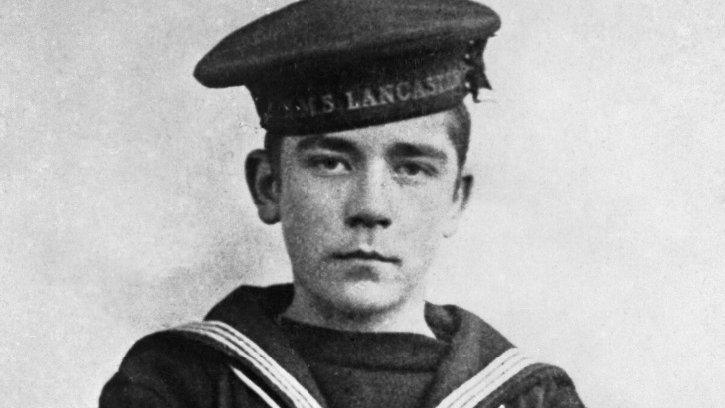Battle of Jutland centenary marked
- Published
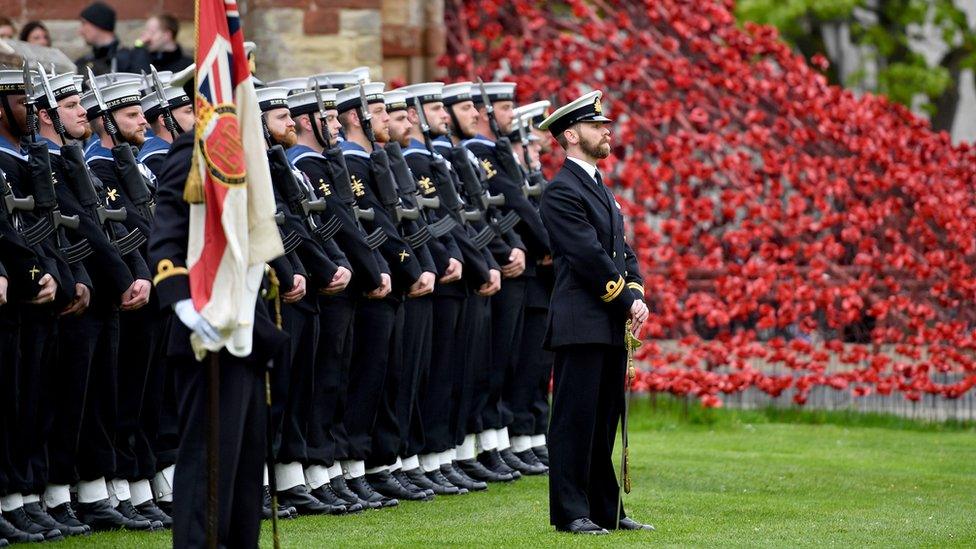
The service at St Magnus Cathedral paid tribute to the sailors who died in the battle
The centenary of the biggest naval engagement of World War One is being marked by commemorative events.
A service at St Magnus Cathedral in Orkney paid tribute to the 8,648 sailors who died during the Battle of Jutland.
A service of remembrance is also taking place on board HMS Duncan at Jutland Bank, the site of the battle.
The battle was fought near the coast of Denmark on 31 May and 1 June 1916 and involved about 250 ships.
It saw the Royal Navy's Grand Fleet, based at Scapa Flow in Orkney, clash with the German High Seas Fleet.
Prime Minister David Cameron and German President Joachim Gauck attended the Kirkwall service, along with the Princess Royal and her husband Vice Admiral Sir Tim Laurence, representing the Commonwealth War Graves Commission.
Events continued with a service at Lyness Cemetery on the island of Hoy - the final resting place for more than 450 service personnel who died in the war, including sailors killed at Jutland.
The Duke of Edinburgh had also been due to go to Orkney, but pulled out following medical advice.
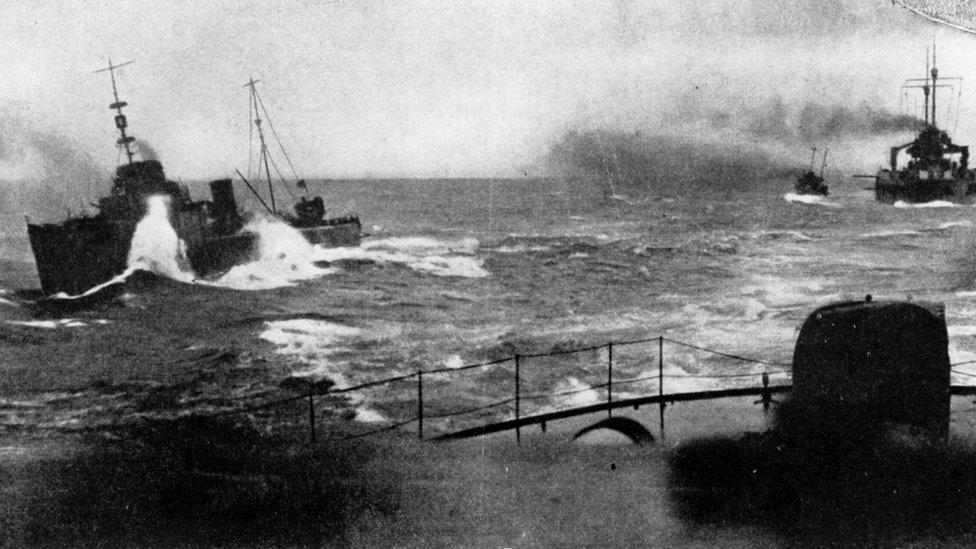
The German fleet are deflected from bombarding the British coast by Admiral Beatty's battle cruiser squadron during the battle

From the BBC's Robert Hall in Orkney
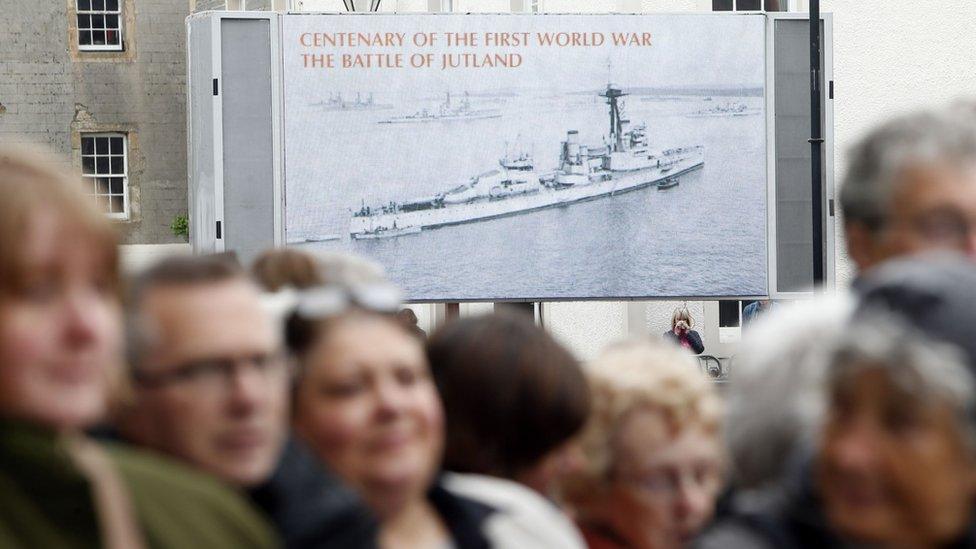
On the street outside the UK's most northerly cathedral, islanders young and old crowded the pavements as the Royal Marines band led a naval contingent, bayonets gleaming to the morning commemoration.
It was a powerful reminder of Orkney's naval history; Britain's Grand Fleet sailed to Jutland from the deep anchorage at Scapa Flow. Nearly 6,000 men never returned.
The services at Kirkwall and Lyness mark the loss of 25 ships, British and German, in a clash which resulted in no clear victory.
A century ago an islander called Margaret Tait captured the mood after the battle.
"What a gloom was cast over the town, and how depressed we were to think of our noble ships, brave sailors and officers."
Later, family members and representatives of today's navies will re-tell the stories of Jutland, and remember those who still lie beneath the dark waters of the North Sea.

Representatives of all the other nations connected to the battle - Australia, Canada, Ireland, Japan, Malta, New Zealand and South Africa - were at the cathedral.
The commemoration was led by the minister of the cathedral, Fraser MacNaughton.
He was joined by the Royal Navy's chaplain of the fleet, the Venerable Ian Wheatley, and a German naval chaplain.
In the North Sea, The German ship FGS Schleswig-Holstein will join HMS Duncan at Jutland Bank.
Wife and eight children
Many relatives of those who took part in the battle were in Orkney for the commemorations.
Alexander Nicol's grandfather, John, drowned when HMS Invincible exploded and went down with the loss of more than 1,000 men.
He left a wife and eight children.
Mr Nicol said: "I'm fortunate enough to be a grandfather in my own right... My grandfather didn't live to see any of his children get married, let alone to see any of his grandchildren. So to me it's a privilege that he missed out on."
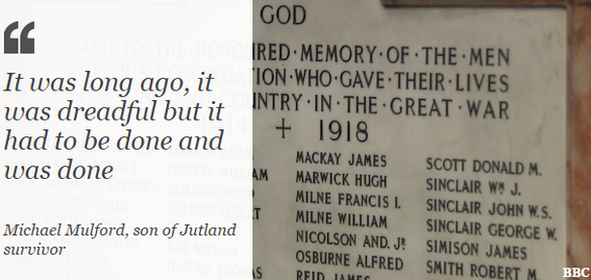
Michael Mulford's father Mark survived the battle as a teenager aboard the HMS Malaya, which was hit eight times with the loss of more than 60 men.
Mr Mulford said his father, then 19, had watched as the bodies were sewn into hammocks and released over the side.
He told the BBC: "I can't really imagine it because what he ever said about it was absolutely nothing - which speaks volumes for the horror of raw naval warfare.
"This was duty, this was service, but whatever else, it was nothing you could talk about at the dinner table. It was not something to regale the grandchildren with. It was long ago, it was dreadful but it had to be done and was done."
Mr Mulford added: "Today is a day for peace and reconciliation."
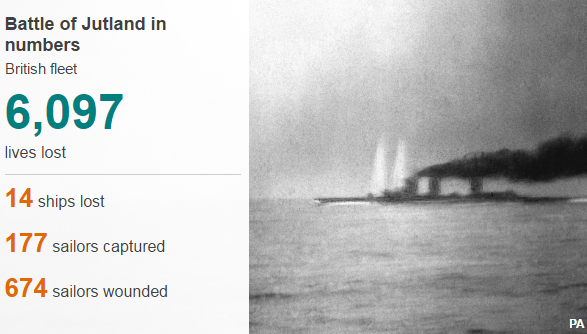
The Battle of Jutland was the only major sea battle of World War One. It was a battle that Britain, with its long naval tradition, was widely expected to win.
Germany's fleet, under the command of Vice-Admiral Reinhard Scheer, was aware of the Royal Navy Grand Fleet's superiority in terms of numbers, and wanted to lure Britain's battle cruisers into a trap.
The German admiral's strategy was to draw portions of the British fleet into battle with a strike at Allied shipping off the Norwegian coast.
However, British admiralty intelligence intercepted a German radio message saying the High Seas Fleet was preparing to leave port and the commander of the British fleet, Admiral Sir John Jellicoe, sailed from Scapa Flow in Orkney to intercept it.
There were a series of clashes throughout 31 May, including the loss of HMS Indefatigable which was hit by German shellfire and exploded in a ball of flame.
From a crew of 1,019 men, only two survived.
HMS Queen Mary was also sunk, with the loss of 1,266 crew.
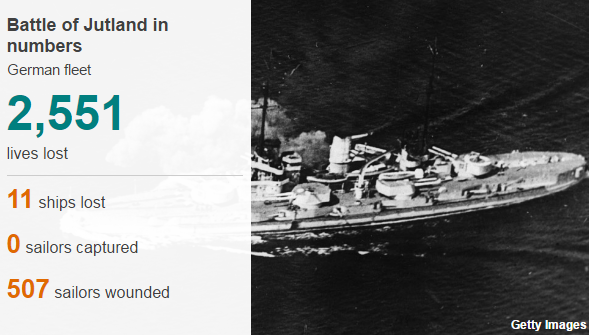
The main battle began at about 18:30 on 31 May when Vice-Admiral Scheer realised he was up against the entire British Grand Fleet.
At the end of the engagement, the British had lost more in terms of ships and men, but it later emerged the Germans had concealed the scuttling of two of their ships, and it soon became seen as a strategic victory for the Royal Navy.
In a message on the St Magnus order of service, the Duke of Edinburgh said that, whatever the judgement on the outcome, the commemorations were focused on the "endurance and gallantry" of all those who took part.

From BBC Scotland's Claire Diamond on the island of Hoy
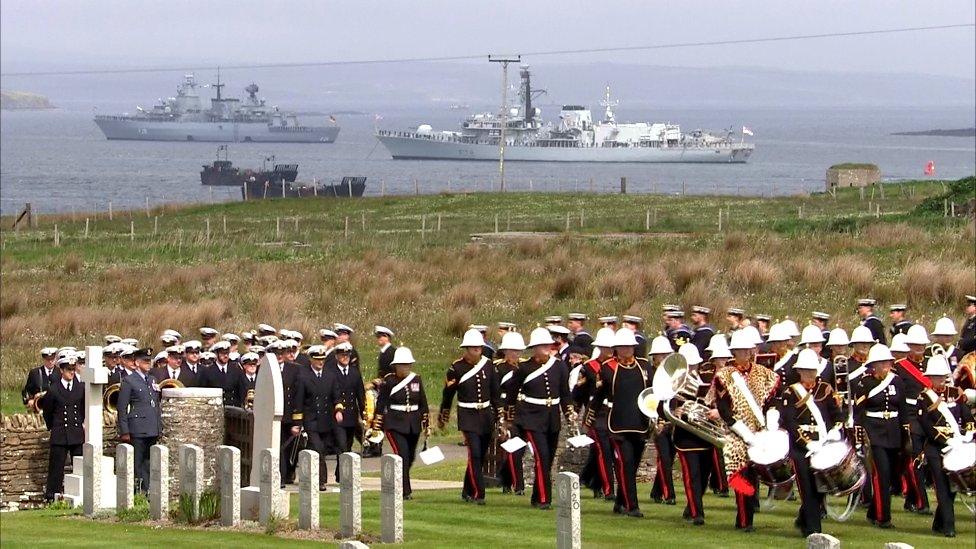
A ceremony was also held at Lyness Cemetery on the island of Hoy
It was a bleak, windy afternoon but you could still see the Royal Navy's HMS Kent and the German Navy's Schleswig-Holstein in the water through the fog.
The Princess Royal and David Cameron were among the six dignitaries who laid wreaths at the Cross of Sacrifice to represent the British and German lives lost.
The granite cross was built 10 years after Jutland to pay tribute to the Royal Navy's work. Inscribed on it are the words "Their name liveth for evermore".
The graves of those buried at Lyness overlook the waters where many of the sailors served.
Many of the bodies recovered from the battle were never identified and their graves bear the inscription "Known Unto God".
There are graves here from both British and German sailors - "former enemies now united and at peace", said Vice Admiral Sir Tim Laurence of the Commonwealth War Graves Commission.
- Published31 May 2016
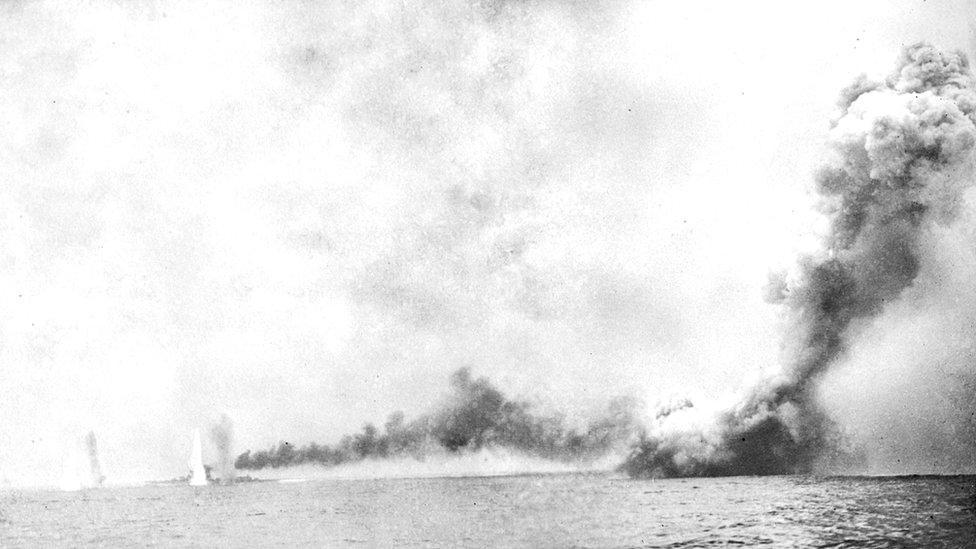
- Published31 May 2016
- Published30 May 2016
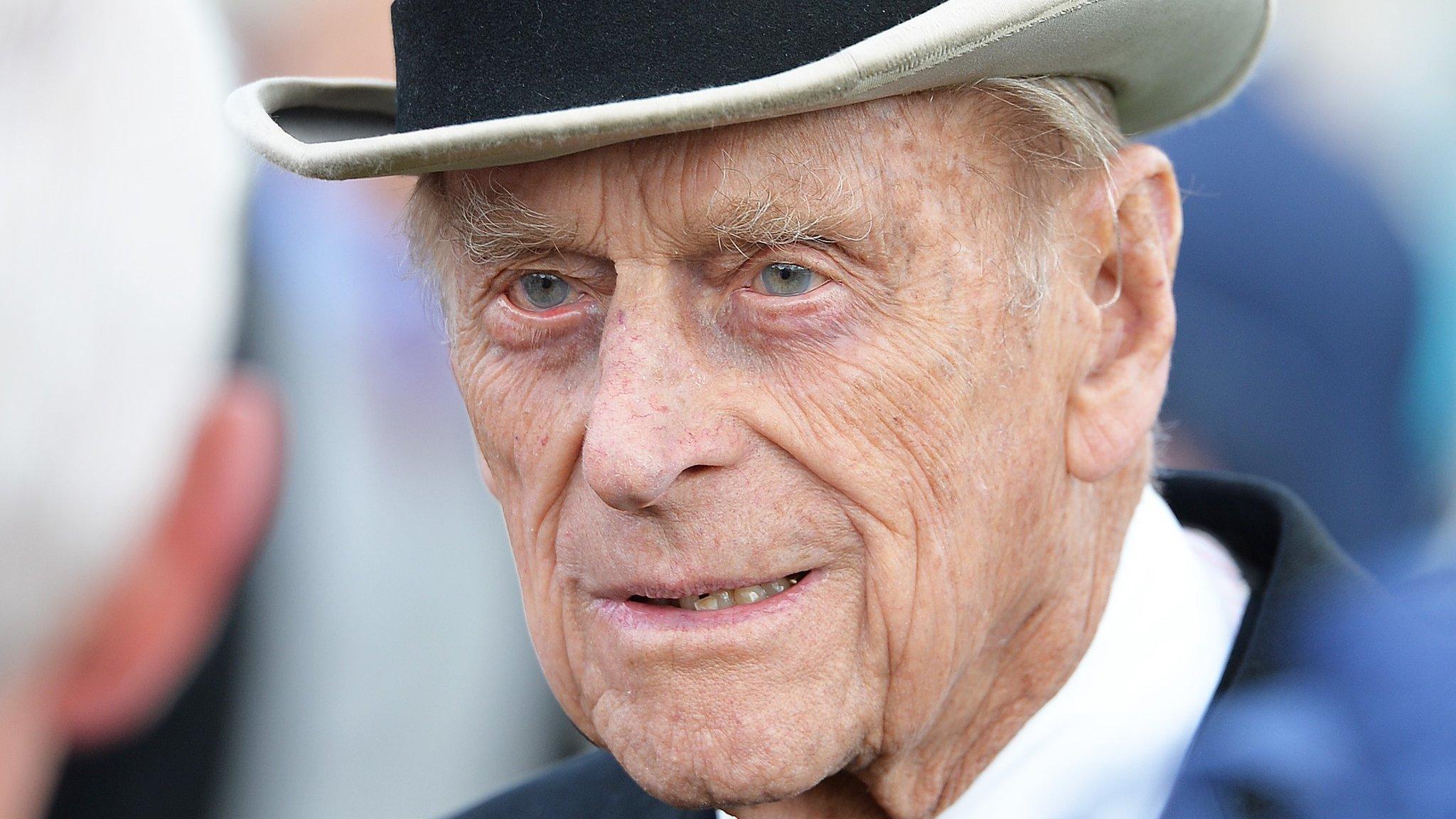
- Published26 May 2016
